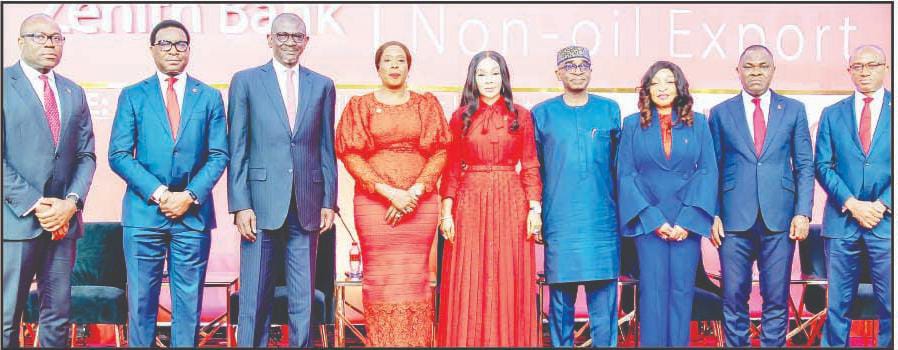
Zenith Bank calls for aggressive push to boost Nigeria’s non-oil exports
By Esther Agbo
At the 9th edition of the Zenith Bank International Trade Seminar, held on September 4, 2024, industry leaders and government officials united in a powerful call to awaken Nigeria’s non-oil export potential.
Under the theme, “Nigerian Non-Oil Export Industry: Awakening the Giant,” the seminar emphasized the urgent need for economic diversification, highlighting agriculture, mining, and creative industries as key pillars for sustainable growth.
The Group Managing Director and CEO of Zenith Bank PLC, Dame Dr. Adaora Umeoji, opened the event by stressing the importance of non-oil exports to Nigeria’s economic future.
She highlighted Zenith Bank’s role in bolstering this sector and urged collaboration across all sectors to enhance the country’s GDP.
She said, “Zenith Bank is forced to collaborate with other non- oil export customers and their stakeholders to be able to make a difference. This area has lasted as Nigeria’s most protected transport platform, helping non- oil export people that have been harassed, discover opportunities and proper solutions to the challenges that exist in this country.
“Recommendations from this previous edition have formed valuable pieces for government policies on trade and non- oil export.
Nigeria is blessed with very wide and wide range of exportable natural resources.
“However, the contribution of non-oil exports to both GDP and total exports is still very low. The highest recent year was 1.33 per cent, in 2019, and in 2023 the contribution was just 1.34 per cent.
Crude oil and natural gas, natural resources of since the early 8th century export, accounted for only 9.55 per cent of total exports. My total value of non oil exports was 1.34 per cent, accounting for just 10 per cent of total exports. to be at the forefront of this effort.
“As the best and largest bank in Nigeria, we will continue to finance and support the long-term establishment of this economy.”
Agriculture emerged as a central theme, with the Director of Agrobusiness and Market Development, emphasizing the critical role of agriculture in Nigeria’s economy.
He advocated for improved land resource management and the adoption of innovative initiatives like the green credit system to boost productivity and exports.
Moreover, the mining sector also took center stage, with representatives from Lagos, Nasarawa, and Zamfara states outlining their strategies to unlock the economic potential of their natural resources.
Lagos State’s Commissioner of Commerce, Trade, and Investment, Mrs. Folashade Ambrose-Medebem, representing the Governor of Lagos State, Babajide Sanwo Olu highlighted the state’s strategic infrastructure projects, including the Lekki Free Trade Zone, as catalysts for economic diversification.
“Additionally, we are planning to work closely, and much more closely, including the Ministry of Commerce, Properties, Trade and Investment as well, with Zenith Bank, to provide manufacturers with access to affordable financing and other support services.
“The Africa-Continental Free Trade Agreement presents a unique opportunity for Lagos to expand its manufacturing base and access new markets as well.
“And at the heart of our economic transformation agenda is the Lekki Free Trade Zone, a zone that represents a cornerstone of our strategy to diversify Lagos’ economy and enhance its global competitiveness,” she stated.
Furthermore, stakeholders discussed the pivotal role of education, infrastructure, and capacity building in supporting non-oil exports, calling for cross-sector collaboration to drive diversification and economic resilience.
In a keynote address, the National Coordinator of the National Action Committee for AFCFTA, Olusegun Awolowo, presented a robust argument for reducing Nigeria’s dependency on oil.
He called for a renewed focus on the “Zero-Oil Plan” and urged private sector leaders to step up investments in agriculture, petrochemicals, and other non-oil sectors. Awolowo emphasized the potential of the African Continental Free Trade Area (AfCFTA) in opening new markets and driving economic transformation.
He said, “The private sector that we wait for is the revival of the non-oil exports.
We looked at the current products, the 22 products that Nigeria must invest in for us to make this money that we’re living on.
“And we looked at the big-ticket products for large-scale investments we’re looking at. We looked at petrochemicals and methanol. Then, in 2020, we revised the zero-oil plan.
“Petrochemicals and methanol was $150 billion. Trade in high-value is your value. Today it’s $350 billion.”
The Managing Director and CEO of the Nigerian Export-Import Bank, Abubakar Bello, concluded the seminar with a call to action for better export financing and infrastructure.
He pointed out the significant potential in value addition, particularly in the solid minerals and agricultural sectors, and urged the country to move up the value chain to compete effectively on the global stage.




